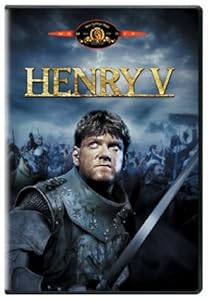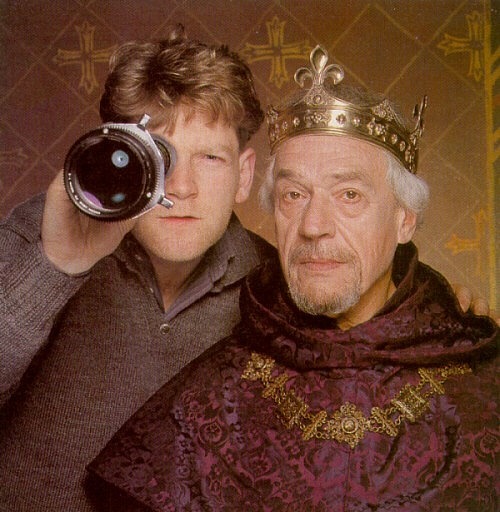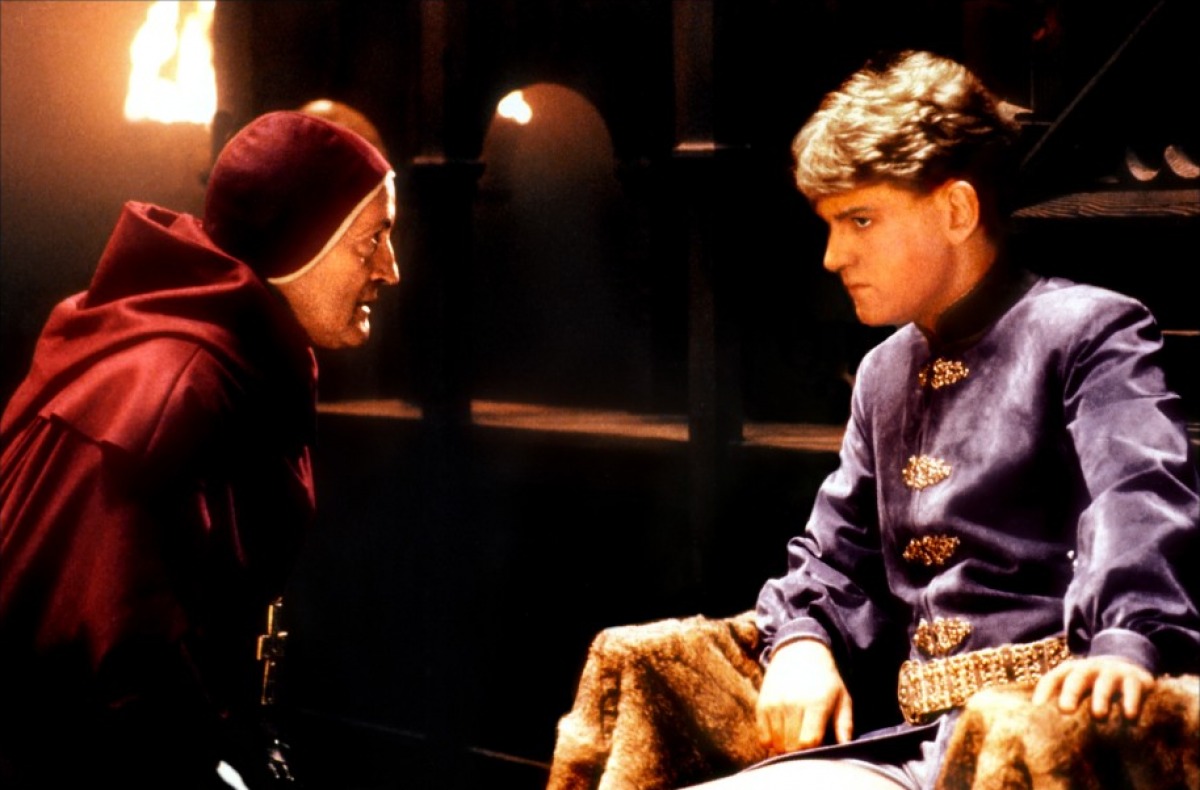
When Henry V debuted in 1989, 28-year-old director and star Kenneth Branagh was hailed as the new Olivier. It was something of a premature announcement, but not unwarranted. Twenty-five years later, it’s still Branagh’s best movie, even if he did improve in subsequent films. For instance, Henry V’s beginning is weighed down by dull politics and difficult language (though Derek Jacobi’s opening monologue is inspired,) and Much Ado About Nothing, by contrast, improves in clarity. But Branagh proved to suffer from Peter Jackson Syndrome: his judgment clouded by fame and large budgets.
As a Shakespeare fan, I’m nowhere near expert. Henry V is my favorite movie adaptation of The Bard, and my inexperience may partly be the reason—for it is both accessible in its raw, visceral emotion and complex in its treatment of the subject material. Still, I'd definitely recommend this one to those who have read the play, for it often opts for emotion over simplicity.
A plot summary really ought to be
superfluous, but Henry V isn’t actually as familiar on a cultural level as
Julius Caesar or Romeo and Juliet. In brief, it’s the tale of a young medieval king
who led his country to war against France, narrated by a snazzily-dressed Derek
Jacobi, and featuring the best pre-battle pep talk of all time.
“We few, we happy few, we band of
brothers.” That one.
Branagh is supported by a superb
cast, mining the deep vein of Shakespearean alumni among Britain’s treaders of
the boards. In fact, no less than five former RSC King Henry’s appear (and
would, Branagh said, wink at him when they approved of his performance.)
Richard
Briers is unrecognizable as the buffoonish Bardolph (he plays aristocratic
Leonarto in Much Ado), Jacobi is
charismatic and forceful, an impish Emma Thompson has terrific chemistry with
her then-husband Branagh.
Ian Holm provides some heart as spunky Welshman Captain Fluellen, and Judi Dench makes the most of her small part, as does fifteen-year-old Christian Bale (who Branagh coaxed from hiding after the unwanted fame of Empire of the Sun.)
Ian Holm provides some heart as spunky Welshman Captain Fluellen, and Judi Dench makes the most of her small part, as does fifteen-year-old Christian Bale (who Branagh coaxed from hiding after the unwanted fame of Empire of the Sun.)
An
inconspicuous Paul Scofield could hardly be more different from his signature
role of self-assured Thomas More, shrinking into himself before the bombastic
over-acting of Michael Maloney as the Dauphin. The wonderfully named
Christopher Ravenscroft is one of my favorites in the relatively small part of
the French herald Montjoy, as is Michael Williams as...heh, Michael Williams.
Patrick Doyle's score while bombastic at times, and with one tune over-used, is sublime. His sweet, solemn rendition of Non Nobis, Domine provides a perfect lament over the amazing tracking shot of the blood-soaked battlefield.
Patrick Doyle's score while bombastic at times, and with one tune over-used, is sublime. His sweet, solemn rendition of Non Nobis, Domine provides a perfect lament over the amazing tracking shot of the blood-soaked battlefield.
Branagh grows more confident as the story moves along, which neatly dovetails with the
king’s character arc (the film itself was shot chronologically). In the first
moments, we are unsure of this fresh-faced, velvet-clad, soft-spoken young “Harry,”
but he begins to show his mettle and Solomon-like insight throughout his icy
diplomatic relations and shrewd perception of treason in the ranks.
Upon his arrival in France, Harry reveals
his fiery side (“once more unto the breach!”), but the flames are swiftly
quenched by torrential rains and severe punishment for misconduct among the
troops. Darkness falls, and the dismal English soldiers huddle on the brink of
a final clash with the pristine French military. A blend of patriotism, greed,
and bravado has drawn Harry’s motley crew to these foreign shores, yet it remains
to be seen whether their young king can rally them to face an organized threat.
And Harry himself is not entirely sure…the gloomy night, full of “umber’d faces”
lends itself perfectly to his self-searching and heart-probing.
 Here Branagh begins to focus on the
dark, grittier side of medieval warfare that Shakespeare hints at through Michael Williams. Contrasted with this “heavy reckoning,” what is the use of glory? What separates a
slave from a king but mere “ceremony?” Even after twenty-five years of the
excesses of Gibson and Tarantino, Henry V’s
warfare is harrowing and exhausting, and yet conscientious, for
there is no triumphalism over stock-villains. It is mere physical struggle and
raw emotion. Here is none of Olivier’s clean, refined patriotism, but a more complex,
modern vision of battle.
Here Branagh begins to focus on the
dark, grittier side of medieval warfare that Shakespeare hints at through Michael Williams. Contrasted with this “heavy reckoning,” what is the use of glory? What separates a
slave from a king but mere “ceremony?” Even after twenty-five years of the
excesses of Gibson and Tarantino, Henry V’s
warfare is harrowing and exhausting, and yet conscientious, for
there is no triumphalism over stock-villains. It is mere physical struggle and
raw emotion. Here is none of Olivier’s clean, refined patriotism, but a more complex,
modern vision of battle.
And yet, the story is still wedded with the
ancient camaraderie of fellow soldiers, the original “band of brothers,” wonderfully
evoked in Branagh’s superb rendition of the St. Crispin’s Day speech. Death and
glory. One cannot exist without the other, and the bittersweet combination casts
a shadow over what should be a lighthearted finish, reflected in flashbacks shot
between the icy glare of Henry and the exhausted gaze of the French King.
It's a story for the post-Vietnam era, but which still remembers the days of honor and courage. We need more of that these days.
It's a story for the post-Vietnam era, but which still remembers the days of honor and courage. We need more of that these days.




I think this is the best Henry V, though I have to confess I have seen only clips of Olivier. I'm comparing it mainly with Hiddleston's BBC version, which I saw first. A lot of folks were saying "Go back and watch the real thing, 'cuz this ain't it!" I still really liked some things about the BBC version (especially the Hiddles, obviously), but I had to admit Branagh's was superior on almost every level. For one thing, the costume design--the (female) director of the BBC version deliberately put Hiddles into a rather, er, revealing set of hose. None of that nonsense with Branagh, obviously. Also, what up with the black Duke of York?? Don't get me wrong, dude was a great actor, but seriously? Are we making a historical play or a revisionist re-interpretation?
ReplyDeleteI also realized that the Hiddles version chopped stuff out in a way that didn't always make sense. For example, they have the killing of the French prisoners but not the scene where Henry finds the murdered mule boys, setting off the furious order in the first place. So it comes seemingly out of nowhere. Now in Branagh's version, they find the mule boys, but the bloodthirsty order is eliminated, so they're picking and choosing too, but if you had to pick one or the other to cut out, it makes way more sense to cut out Henry's reaction than the catalyst for it. All the juicy scenes of political intrigue that Branagh does so brilliantly were cut from the Hiddles version as well. Honestly though, I can't imagine anyone but Branagh doing them. He's freakishly good---maybe even more complex and nuanced an actor than Hiddleston, and at a younger age too which is doubly freaky.
Not having read the text myself, I wanted to get your opinion on the proposal scene with the young princess, if you've seen both versions. In the Hiddles version, don't get me wrong Hiddles is very charming, but the way the scene is played, she's much younger for one thing, and he's much more cool about it. Someone described it as "vampirey," and I admit the whole thing did wind up having a bit of an Edward and Bella vibe. "His beauty stunned my mind" and all that. In Branagh's version, by contrast, he seems like he's totally wearing his heart on his sleeve and he's just smitten with her, plain and simple. Emma Thompson is also older and plays the princess very canny and intelligent, while the actress in the Hiddles version is very "deer in the headlights" about the whole thing. So the Branagh version is way more fun and romantic. My question to you is, which version captures Shakespeare's original intent better, assuming you've read it?
As a final few words about the play itself, I find it ironic that such stirring patriotic speeches are set in a context where the justness of the war is, shall we say, highly questionable. Henry simply decided he was going to claim France and that was that. My sympathies are with the French in that war, frankly. But we're supposed to get all choked up by these speeches without really letting ourselves think about that. Taken by themselves, set pieces like "Once more unto the breach" and "We few, we happy few" ARE very inspiring, and could be used to commemorate, say, the anniversary of D-Day (which just passed the other day---70 years!) But in the context of the play, they really don't make much sense.
I haven't seen Olivier either, and only bits of Hiddleston, but I got the same impression. I have read the play, but only after already accepting Branagh's Henry as the standard, so it's hard to say whether I'm reflecting that *onto* the play.
DeleteYou always get into trouble when the words "Shakespeare's original intent" come up, and that's both fun and frustrating. Like the debate about whether Hamlet was mad or just pretending (I incline to the latter) - the transcript of Shakespeare's Oprah interview is missing, so we can't know his thoughts, and the play can be read either way. Henry V is the same - depending on how one plays it, it can seem pro-war or anti-war, or a mix of both. Obviously, Shakespeare made England look *very* good in the St. Crispin's Day speech and when the French slaughtered the kids, but he also had Nym and Pistol causing trouble. The French noblemen were buffoonish and foppish (talking about their armor and horses before the battle), while the Englishmen mused about the philosophical ramifications of war. Harry was brave; the French king was indecisive. Harry's method of speech could have been parodied by Pistol's empty speechifying. All this depends on the delivery, on the editing.
Olivier, in 1944, was understandably patriotic. Branagh shows a mix of the glory of cameraderie and the actual horror of battle. It sounds like Hiddleston is a little rougher on the English - having them slaughter the prisoners without showing the motivation (I don't think either the death of the kids or the execution of the prisoners happened in real life - Shakepeare fudged a lot of facts), and being more of an unwanted suitor with Katherine.
Personally, I like Branagh's interpretation of Shakespeare. If anything, it's the right one for right now - it doesn't glamorize war, but it honors warriors. It's very much an emotional experience instead of an intellectual one. It's best when viewed that way, imho.
Now the Katherine scene may be rather inappropriately light given the darkness of earlier scenes (therefore Hiddleston may be right to place a slightly creepy shade on it.) After all, she was being *bought* by a conquering king. But I love the chemistry between Branagh and Thompson (for more of that - see Much Ado About Nothing.)